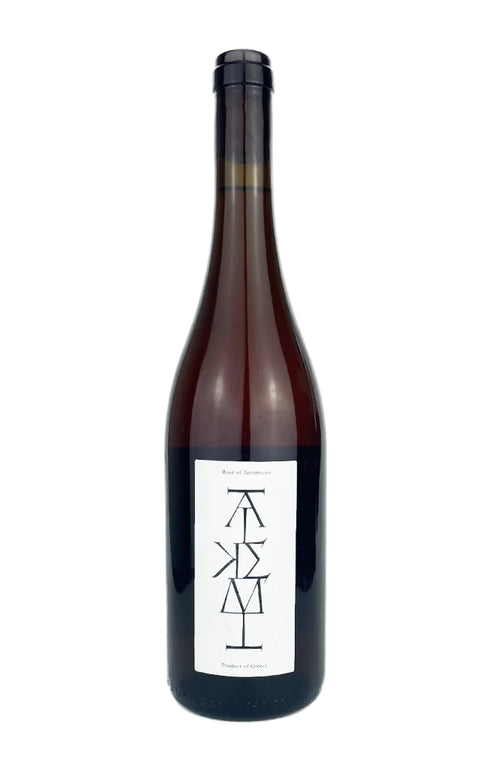
Alkemi Rose Xinomavro Markovitis Winery
ORGANIC (UNCERTIFIED) / VEGAN / GREEK WINE / ROSE WINE
A bold and complex Greek rosé wine made from the red Xinomavro grape: fresh, elegant, and with real depth. This is a serious rosé with structure and spice that will change everything you thought you knew about rose, perfect for food but just as at home for an aperitif.
- Origin: Naoussa, Greece
- Producer: Markovitis Winery
- Vintage: 2023
- Grape variety: Xinomavro
- Food pairing: Curry, Mediterranean veg, moussaka, lamb
- Bottle size: 75cl
- ABV: 13.5%
Flavour profile
Expect notes of wild strawberry, rose petal, and blood orange, with layers of baking spice and a hint of tomato leaf. There’s a gentle grip from the tannins, a clean, dry finish, and refreshing acidity throughout. This Greek wine is savoury, structured, and a little bit wild, far from your average rose wine.
About Markovitis Winery
Markovitis Winery (formerly Chateau Pegasus) is a pioneer of organic viticulture in Greece, located in the famed Naoussa region of northern Greece. Now run by the third generation, the winery focuses solely on Xinomavro, producing age-worthy wines with a hands-off approach, low intervention, and a deep respect for the land. Their Alkemi line is their more expressive, experimental side, and this rosé is a perfect example.
About Xinomavro
Xinomavro is often described as Greece’s answer to Nebbiolo or Pinot Noir; it’s known for its firm tannins, lively acidity, and earthy, savoury complexity. Native to the Macedonia region and especially at home in Naoussa, it typically makes bold reds, but here it’s crafted into a rare and refined rosé that still carries the grape’s distinct personality.
How to pair it
This is a food-friendly rosé that shines with grilled lamb, roasted vegetables, tomato-based dishes, mezze, or even duck. Its acidity and light tannins give it the structure to handle richer meals, while the floral and fruity notes keep it fresh enough for lighter fare or just having on its own on a warm evening.
Delivery and returns
What are the delivery options?
- Local Delivery (E17, E10 postcodes): Free over £35
- Click & Collect: Free
- Standard Delivery: £8.95 (Free over £80)
Where can I get my order delivered?
- Local Delivery is available within London E17 and E10 postcodes.
- Click & Collect orders can be picked up at our shop located at 149 Forest Rd, E17 6HE.
When will my order arrive?
- Next day service is available for local and standard deliveries (subject to availability).
- All orders placed by midnight will be dispatched the next working day.
Why do I need to pay for returns?
- If returning your order by mail, the buyer is responsible for the return shipping cost.
- You may return your purchase within 30 days if you are unsatisfied for any reason.
How do I return my order?
- Free returns are available if you return your order to our store.
- If returning by mail, you may ship back the item using the carrier of your choice.
Frequently Asked Questions
Is rosé popular in Greece?
Rosé is growing in popularity in Greece, especially among younger winemakers exploring local grapes in fresh, modern ways. While Greece is better known for its bold reds and crisp island whites, serious, food-friendly rosés, like those made from Xinomavro, are carving out a space for themselves. They often have more structure and savoury notes than an average summer rosé, making them a great match for Mediterranean food.
What kind of wine is Xinomavro?
Xinomavro is one of Greece’s most celebrated red grape varieties, known for making wines that are high in acidity, firm in tannins, and full of character. It’s the flagship grape of the Macedonia region in northern Greece, often producing complex, age-worthy reds with flavours of cherry, tomato leaf, olive, and dried herbs. It can also be made into elegant rosés and, occasionally, lighter, chillable reds.
Is Xinomavro like Pinot Noir?
Xinomavro is sometimes compared to Pinot Noir, and also to Nebbiolo, because of its complex aromas, savoury notes, and firm structure. Like Pinot, it’s capable of elegance and subtlety, but Xinomavro typically has more tannin and acidity, giving it a bit more grip and ageing potential. If you like serious, nuanced wines with freshness and earthiness, you’ll likely enjoy Xinomavro.
What does the name Xinomavro mean?
The name Xinomavro translates to “acid-black” in Greek, from xino (sour or acidic) and mavro (black). It’s a nod to the grape’s natural acidity and dark-skinned berries, both of which define its bold, structured style.
What food goes well with rosé wine?
Rosé wine is really versatile. Lighter, fruitier styles pair beautifully with salads, grilled fish, seafood, or summer snacks. More structured rosés can stand up to grilled meats, charcuterie, tomato-based dishes, roasted vegetables, and Mediterranean mezze. When in doubt, think of the wine as a bridge between red and white, perfect for anything in between.